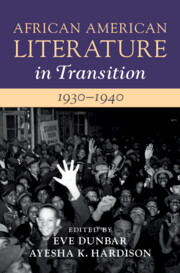Book contents
- African American Literature in Transition, 1930–1940
- African American Literature in Transition
- African American Literature in Transition, 1930–1940
- Copyright page
- Contents
- Figures
- Contributors
- Preface
- Chronology, 1930–1940
- Introduction
- Part I Productive Precarity and Literary Realism
- Part II New Deal, New Methodologies
- Part III Cultivating (New) Black Readers
- Part IV International, Black, and Radical Visions
- Chapter 9 Democracy Unfinished: African Americans Writing “Africa”
- Chapter 10 Langston Hughes and the 1930s: From Harlem to the USSR
- Chapter 11 Black Cultural (Inter)nationalism
- Index
- References
Chapter 11 - Black Cultural (Inter)nationalism
Communism and African American Writing in the Great Depression
from Part IV - International, Black, and Radical Visions
Published online by Cambridge University Press: 25 March 2022
- African American Literature in Transition, 1930–1940
- African American Literature in Transition
- African American Literature in Transition, 1930–1940
- Copyright page
- Contents
- Figures
- Contributors
- Preface
- Chronology, 1930–1940
- Introduction
- Part I Productive Precarity and Literary Realism
- Part II New Deal, New Methodologies
- Part III Cultivating (New) Black Readers
- Part IV International, Black, and Radical Visions
- Chapter 9 Democracy Unfinished: African Americans Writing “Africa”
- Chapter 10 Langston Hughes and the 1930s: From Harlem to the USSR
- Chapter 11 Black Cultural (Inter)nationalism
- Index
- References
Summary
This chapter identifies the US Communist left as a major influence on African American writers and activists during the 1930s. Black writers who began their careers during the Depression era often sought to distinguish themselves from the Harlem Renaissance of the previous decade, and the Communist left furnished a political and literary discourse, as well as sustaining institutional support, that enabled Black writers to pioneer a distinctive practice of politics and art. The chapter analyzes the reasons why Black writers were drawn to the Communist movement, and outlines the Communist-backed organizations and causes that inspired African Americans in the decade. Through a reading of work by Richard Wright, Eugene Gordon, Margaret Walker, Theodore Ward, Ralph Ellison, and others, the chapter identifies the complex dialectic of Black cultural particularity and Marxist theory that distinguishes the literary output of 1930s African American writers on the left.
- Type
- Chapter
- Information
- African American Literature in Transition, 1930–1940 , pp. 321 - 348Publisher: Cambridge University PressPrint publication year: 2022

